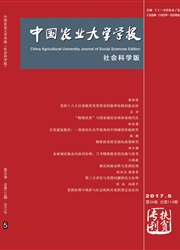

 中文摘要:
中文摘要:
文章基于江苏省的调查数据,分析了农村老年人医疗服务需求及利用状况,并与非老年人的医疗服务需求及利用状况进行了比较研究,发现农村老年人健康状况更差,医疗服务需求更高,但医疗服务利用率较低。运用两部模型法分析结果显示:疾病严重程度、地区变量对农村老年人和非老年人的医疗服务利用都具有显著影响;家庭人均收入、是否参加新农合、是否患有慢性病、自评健康状况等变量对农村老年人医疗服务利用的影响大于非老年人;医疗服务利用的不平等性显著。新农合制度有效地促进了农村老年人的医疗服务利用率。
 英文摘要:
英文摘要:
Based on the survey data of Jiangsu Province, this paper empirical analyzed the situation of medical service demand and utilization of the elders in rural areas, and compared them with non-elders'. The results showed that the health situation of the elders is worse than the non-elders, which means that the medical service demand of the elders is higher than non-elders', meanwhile the rate of the medical service utilization of elders is lower. The results of two-part model showed that disease severity and region variable had a significant impact of both elders and non-elders. Household per capita income, whether to participate in the NCMS or not, the health situation they felt of themselves and other variables showed more significant impact of the medical service utilization of elders than them of the non-elders', the inequality of health service utilization was higher. The NCMS promoted the rate of the medical service utilization of eiders effectively.
 同期刊论文项目
同期刊论文项目
 同项目期刊论文
同项目期刊论文
 期刊信息
期刊信息
